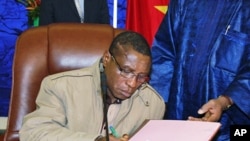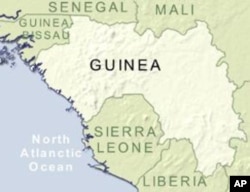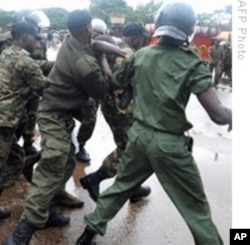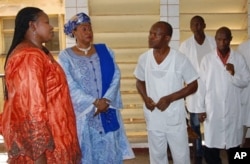A fact-finding report commissioned by Guinea’s military junta to study last September’s Conakry soccer stadium massacre has come under fire for having sharp inconsistencies with the findings of a high level U.N. inquiry. The International Center for Transitional Justice (ICTJ), says that the report into the September 28 killings and raping of civilians protesting against Guinea’s military junta failed consistently to account for what it called the “abhorrent abuses committed against the exercise of civil and political rights.”
NGO’s and international agencies estimate that more than 150 civilians were killed during the rampage and more than 100 women were raped. The Conakry regime only confirms that 50 civilians lost their lives.
For its study, the junta hired an American consulting firm headed by former Chief Prosecutor at the Special Court for Sierra Leone David Crane and former Special Court investigator Alan White. But the director of the ICTJ’s Truth and Memory program, Eduardo Gonzalez, says the discrepancies go beyond a distinguished panel of jurists and the junta’s dispute over the number of victims involved.
“The numbers are not perhaps the best place to start an inquiry. The important thing to know is whether there is a pattern of criminality that can be confirmed and on the basis of understanding the pattern, then go to the exact death toll and human costs of these violations. Now, in order to get to that step, you require, first of all, to ask the victims. If the victims do not feel in a situation of security and safety that is appropriate for them to share their stories, then this is not going to be possible,” he said.
A high level U.N. commission inquiry said it has sufficient grounds for finding coup leader Captain Moussa Dadis Camara directly responsible for the rash of killings and rapes, which it classified as crimes against humanity. On December 3, Captain Camara was wounded by soldiers under the command of his aide, Abubakar Sidike "Toumba" Diakite. Although he recovered from his wounds, Camara has agreed not to return to Guinea, pending that country’s holding of democratic elections and its return to civilian rule.
While the junta-commisssioned Crane Report assigns culpability for the massacre to the army unit commanded by “Toumba” Diakite, Mr. Gonzalez of the International Center for Transitional Justice contends that greater international scrutiny will uncover evidence that the September 28 violence was planned and organized by authorities above the units that carried it out.
“First of all, we are talking here about a crime that was committed using a state apparatus. There are individuals who carried out the massacre, individuals who planned these activities, on top of the direct orders and the direct involvement of Mr. Camara. So if Guinea is going to have a chance at reconstructing its democracy, it has to try to comply with international standards going way beyond what these preliminary investigations have shown,” he argued.
Guinea’s current military chief, Brigadier General Sekouba Konate, has agreed to a plan to hold elections by June. The International Center for Transitional Justice, which operates in more than 20 countries on five continents, contends that to make the transition succeed, civil society groups and others in Guinea must be allowed to “confront the past with honesty, integrity and vigor” and conduct a credible probe that assigns accountability for the recent misdeeds that the junta has so far allowed to go unpunished.














